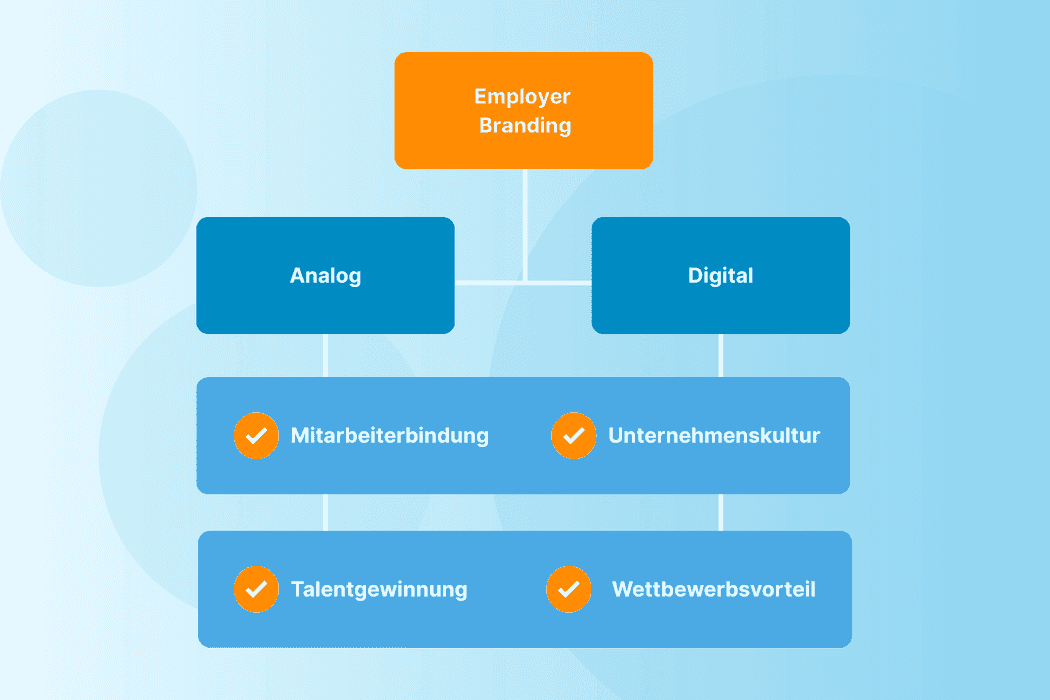Employer Branding: Inspiring and Retaining Talents
In times of skilled labor shortages and the increasing significance of individual career paths, Employer Branding becomes a central success factor for companies. It is no longer just a buzzword in the realm of human resources but a strategic pillar that can determine success or failure in attracting and retaining talents. In this article, we will delve into the world of Employer Branding, explore its essential concepts, and understand why it has become indispensable for modern companies.

Definition of Employer Branding
Employer Branding is not just a trend. It is a powerful tool to shape and convey an employer's identity. It goes beyond traditional recruiting and aims to position the company as an attractive workplace that not only attracts top talents but also retains them in the long term. This strategy actively involves employees in brand communication, emphasizing their role as authentic ambassadors of the corporate culture.
This definition underscores the need to consider employees as central actors in the perception and promotion of the employer brand. Successful Employer Branding goes beyond façades and relies on the authenticity of the corporate culture to have a positive impact on current employees and potential applicants. It is an ongoing process based on trust, transparency, and a clear commitment to company values.
Employee Engagement - The Key Component for Business Success
Companies that actively focus on the engagement of their employees reap numerous benefits. Engaged employees are generally more motivated, productive, and satisfied with their work. They are willing to make extra efforts to achieve corporate goals, positively impacting the work environment.

Why is Employer Branding so Important?
The long-term effects of a well-thought-out Employer Branding strategy are diverse and positive.
Talent Magnet: In times when qualified professionals are scarce, presenting oneself as an attractive employer is crucial. A strong employer brand acts as a magnet for sought-after talents.
Employee Retention: A positive employer brand directly influences employee satisfaction and retention. Employees who are proud of their employer identify more strongly with the corporate culture and remain loyal to the company.
Competitive Advantage: Employer Branding is increasingly becoming a critical competitive advantage. Companies with a positive employer brand not only have better access to top talents but also have a stronger negotiating position in salary negotiations.
Business Success: A robust employer brand not only strengthens the attractiveness to employees but also contributes to a positive overall image of the company. This, in turn, positively impacts customer retention, customer trust, and ultimately the overall success of the company.
Measures for Successful Employer Branding
A strong employer brand consists of various elements that together convey a clear and authentic image of the employer.
Clear Company Values: Clearly define and communicate company values and corporate culture both internally and externally.
Authenticity: Be authentic in your representation. Honesty about strengths and challenges builds trust.
Employee Engagement: Actively involve your employees in Employer Branding. Let their voices and stories be part of your brand communication.
Online Presence: Design an appealing online presence that focuses not only on your products or services but also on your corporate culture.
Attractive Working Conditions: Create a positive work environment and offer attractive additional benefits. These play a crucial role in the decision of applicants for or against your company.
Employer Branding Influencing Factors
Continuous Feedback: Establish feedback mechanisms to continuously evaluate and adapt the effectiveness of your Employer Branding strategy.
Innovation and Technology: Use innovative technologies to strengthen your employer brand on digital platforms. From appealing career pages to social media campaigns, the possibilities are diverse.
International Perspective: In a globalized world, it is essential to create an employer brand that is internationally attractive. Consider cultural differences and adjust your strategy accordingly.
Sustainability and Social Engagement: More and more employees value sustainability and social engagement. Integrate these aspects into your corporate culture and actively communicate them externally.
Crisis Communication: Effective crisis management, coupled with transparent communication, can have a significant impact on the perception of your employer brand in challenging times.
Brand Ambassadors
Employees are not just workers. They are also essential brand ambassadors. Their experiences and opinions significantly influence the image that potential applicants have of a company. Therefore, it is crucial to involve employees in the Employer Branding process and actively engage with their perspectives.
Conclusion
Employer Branding is not a passing trend but an essential strategy for the success of modern companies. Investing in creating a strong employer brand pays off long-term by not only attracting top talents but also strengthening employee retention and positively shaping the company's image in the public eye.
Companies that master the art of Employer Branding lay the foundation for a successful and sustainable future. The competition for talent is intensifying, and a thoughtful Employer Branding strategy is becoming increasingly indispensable in human resource management.